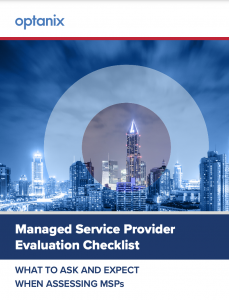
How to Manage Network Services: MSP or In-House
In this post, we will consider the two basic options for how to manage network services for your organization: either in-house or via a Managed Services Provider (MSP).
If your enterprise organization has the right funding and resources, you might just be able to go the distance with an in-house approach. However, for organizations without those resources, in-house may not really be an option.
Determine which option is right for you based on the five primary considerations below: cost, readiness, expertise, reliability, and managing uncertainty. The answer is that it depends.
 Need insight on evaluating a managed service provider for your organization? Download this MSP Evaluation Checklist to ensure you select the best partner.
Need insight on evaluating a managed service provider for your organization? Download this MSP Evaluation Checklist to ensure you select the best partner.
Cost
The first consideration is cost. Almost always, an MSP will come out as the more cost-effective option in the long term when compared with an in-house team.
To start with, MSPs bear the onus of investing in the tools, processes, and staff that are dedicated to the business at hand – delivering managed network services. IT skills and staffing do not come cheap, and any in-house approach will invariably prove expensive to set up and even more costly to maintain and improve over time.
A benefit of partnering with an MSP is that you free your organization up to focus on the core business as opposed to training your team up on how to manage network services and running an internal organization to keep your infrastructure going.
Readiness
In-house teams traditionally are considered an advantage in terms of being on-site and available for in-person support. However, almost two years into the pandemic, these considerations are now largely invalid. End-users and employees have moved on to remote work and access. Today, almost all support is provided through virtual interaction.
In terms of readiness, in-house teams have a harder time providing support during off-hours. And services can be adversely affected when key staff isn’t available due to sickness, vacation, or other IT projects.
MSPs on the other hand provide 24/7/365 levels of readiness when it comes to being available to address issues. This includes aspects around customer support which is key to maintaining uptime by having the ability to troubleshoot and resolve issues on a real-time basis.
Expertise
MSPs spend a lot of time and effort to hire and train staff. In addition to IT operations, they stay on top of industry and vendor-specific MSP certifications. This is a significant factor when it comes to comparing how to manage your network services. It is simply impossible for a small or medium-sized business to keep up with this level of expertise.
Another advantage is the range of expertise in MSP services. While an in-house IT team is dedicated to legacy, current, and immediate future needs, MSPs cater to a broader set of customer needs on a daily basis. This gives them a wider spectrum of knowledge and exposure to emerging trends and technologies.
Guaranteed Reliability and Availability
MSP readiness and expertise capabilities directly contribute to increased effectiveness and productivity for the customer. MSP engagements are defined via Service Level Agreements (SLAs) that detail the binding commitment between the provider and the customer/end-user for the services provided.
There are penalties associated with any degradation or outage related to the services provided. As a result, MSPs prioritize their efforts to ensure that SLA commitments are rigorously observed. After all, their core business depends upon it.
To be fair, in-house IT teams also have their commitments to the level of service they deliver to the organization. However, the MSPs 24/7/364 availability is guaranteed via the SLA and is a clear distinction when comparing how to manage network services.
Managing Uncertainty
If the pandemic proves anything, it’s that managing uncertainty is key to survival. IT teams have been challenged to ramp up services to meet the need for remote working and for increased online interaction.
With their broader capabilities, MSPs are well poised to address such needs by providing the ability to rapidly scale and tailor services to address evolving needs. They have the bench strength and resource capabilities that most in-house IT teams lack when facing similar challenges.
As a customer, MSPs provide you with the flexibility and agility to adapt to evolving situations that are largely out of your control.
As you investigate, you’ll find that in most scenarios, MSPs provide a clear advantage over in-house IT when it comes to how to manage your network services.